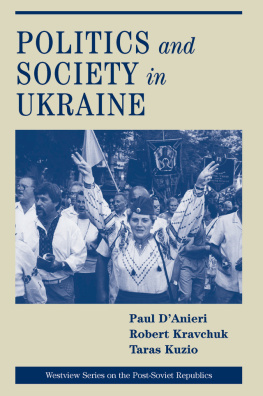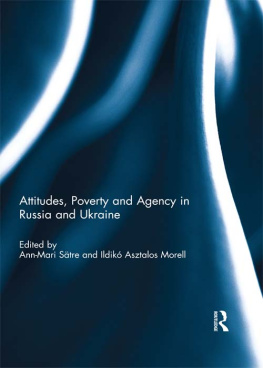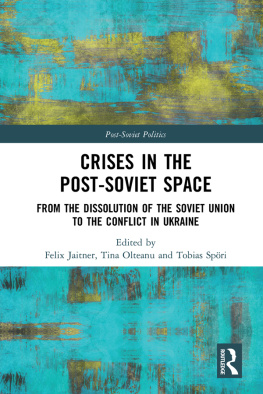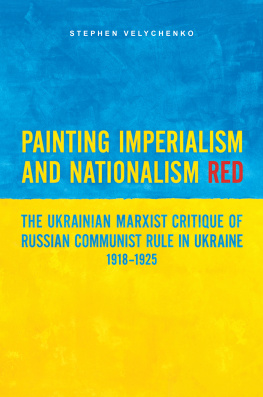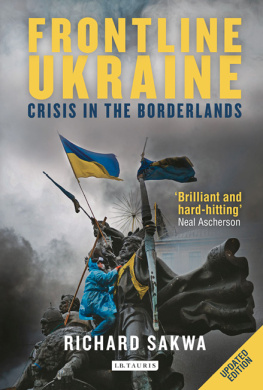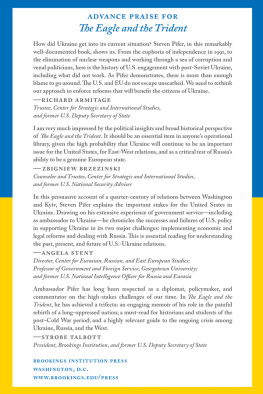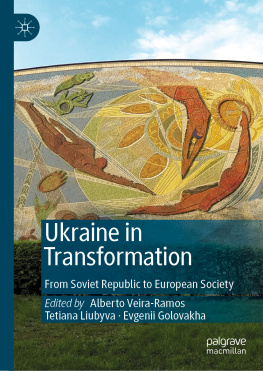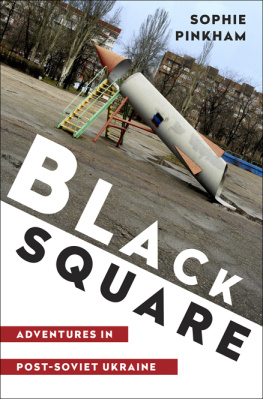POLITICS AND SOCIETY IN UKRAINE
Westview Series on the Post-Soviet Republics
Alexander J. Motyl , Series Editor
Politics and Society in Ukraine, Paul D'Anieri,
Robert Kravchuk, and Taras Kuzio
Siberia: Worlds Apart, Victor L. Mote
The Central Asian States: Discovering Independence, Gregory Gleason
Lithuania: The Rebel Nation, V. Stanley Vardys and Judith B. Sedaitis
Belarus: At a Crossroads in History, Jan Zaprudnik
Estonia: Return to Independence, Rein Taagepera
Politics and Society in Ukraine
Paul D'Anieri
University of Kansas
Robert Kravchuk
University of Connecticut
Taras Kuzio
University of North London
Westview Series on the Past-Soviet Republics
First published 1999 by Westview Press
Published 2018 by Routledge
711 Third Avenue, New York, NY 10017, USA
2 Park Square, Milton Park, Abingdon, Oxon OX14 4RN
Routledge is an imprint of the Taylor & Francis Group, an informa business
Copyright 1999 Taylor & Francis
All rights reserved. No part of this book may be reprinted or reproduced or utilised in any form or by any electronic, mechanical, or other means, now known or hereafter invented, including photocopying and recording, or in any information storage or retrieval system, without permission in writing from the publishers.
Notice:
Product or corporate names may be trademarks or registered trademarks, and are used only for identification and explanation without intent to infringe.
Library of Congress Cataloging-in-Publication Data
D'Anieri, Paul J., 1965
Politics and society in Ukraine / Paul D'Anieri, Robert Kravchuk,
Taras Kuzio.
p. cm. (Westview series on the post-Soviet republics)
Includes bibliographical references and index.
ISBN 0-8133-3537-X (hc). ISBN 0-8133-3538-8 (pbk.)
1. Post-communismUkraine. 2. Political cultureUkraine.
3. UkrainePolitics and government1991 . 4. UkraineSocial
conditions1991 . 5. Social changeUkraine. I. Kravchuk, Robert S.,
1955 . II. Kuzio, Taras. III. Title. IV. Series.
JN6635.D36 1999
306. 2 09477'09049dc21 99-30503
CIP
All photos courtesy of authors
ISBN 13: 978-0-8133-3538-4 (pbk)
Publisher's Note
The publisher has gone to great lengths to ensure the quality of this book but points out that some imperfections from the original may be apparent.
Contents
Guide
| Tables |
| Figures |
| Graphs |
| Photos |
| Maps |
- APA Ukrainian Academy of Public Administration
- CIS Commonwealth of Independent States
- COMECON Council for Mutual Economic Assistance
- ECU European Currency Unit
- EU European Union
- FDI foreign direct investment
- FIGs Financial-Industrial Groups
- G-7 Group of Seven
- GDP gross domestic product
- HRV hryvnya, Ukrainian permanent currency
- ILO International Labor Organization
- IMF International Monetary Fund
- KBV karbovanets, Ukrainian interim currency
- KPU Communist Party of Ukraine
- KUN Congress of Ukrainian Nationalists
- MRBR Inter-Regional Bloc of Reforms
- NATO North Atlantic Treaty Organization
- NBU National Bank of Ukraine
- NDPU People's Democratic Party
- NKVD Soviet secret police
- OECD Organization for Economic Cooperation and Development
- OSCE Organization for Security and Cooperation in Europe
- OUN Organization of Ukrainian Nationalists
- PDVU Party of Democratic Revival
- SPU Socialist Party of Ukraine
- UAPTs Ukrainian Autocephalous Orthodox Church
- UHKTs Ukrainian-Greek Catholic Church
- UICE Ukrainian Interbank Currency Exchange
- UNA Ukrainian National Assembly
- UPA Ukrainian Insurgent Army
- UPTs-KP UPTs-Kyiv Patriarchate
- UPTs-MP UPTs-Moscow Patriarchate
- URP Ukrainian Republican Party
- VAT value-added tax
Despite the flowering of scholarship on Ukraine since its independence in 1991, there has not yet been an attempt to provide a coherent overview of Ukrainian political institutions and the political process in Ukraine. For several years, events moved so quickly that to try to cover them in a book-length study was an invitation to immediate obsolescence. Moreover, many of the basic subjects of such a study, such as the structure of the constitution, were unresolved in Ukraine until relatively recently. Since the adoption of the Ukrainian constitution in 1996 and the introduction of a new currency that year, however, the fundamentals of the independent state are now in place in Ukraine. This is not to deny that much is still in flux but rather to assert that an overview of Ukrainian political structures and processes is now both possible and needed. This book aims to fill that need.
The book is deliberately written from an eclectic theoretical approach rather than by advancing a single theory or interpretation of events. This reflects not only the ambiguity of the subject but the varied backgrounds of the authors: D'Anieri was trained in government and international relations, Kravchuk in public administration, and Kuzio in Ukrainian area studies. We hope that this plurality of perspectives enriches the book as much as it has our own discussions. Although all three authors contributed to the various chapters and all take responsibility for the final product, each took responsibility for the drafting of various of the original chapters, and this division of labor should be made clear: D'Anieri drafted (politics and civil society).
The authors would like to acknowledge the support of the institutions and people who made this project possible. We especially thank Rob Williams of Westview Press, whose combination of support and patience was essential to bringing the project to completion. Paul D'Anieri wishes to thank those at the Harvard Ukrainian Research InstituteDirector Roman Szporluk, Executive Director Jim Clem, and Librarian Ksenya Kiebuzynskiwho provided a wonderful atmosphere for the original drafting of these chapters when D'Anieri was a visiting professor there in the summer of 1998. Robert Kravchuk wishes to acknowledge support from an NSF-COBASE grant, which was instrumental in his work on this project. Taras Kuzio wishes to acknowledge the support of the Centre for Russian and East European Studies at the University of Birmingham, where, while working on this project between 1995 and 1998, he was on a research fellowship funded by the Leverhulme Trust.
We especially thank our families, who endured patiently as we locked ourselves away to work on this project.
Ukraine: Territorial Administrative Structure
Ukraine is important to the West largely because it is seen as the "keystone in the arch" of security in Central Europe. Ukraine is important geopolitically in several ways. First, by putting a powerful state between Germany and Russia, Ukraine ameliorates the security dilemma that led to two wars in the first half of the twentieth century. Second, to the extent that the West continues to feel insecure about a potential threat from Russia, Ukrainian independence creates a strong, independent state through which Russia would have to go before it could renew its threat to the states lying to the west of Ukraine. Third, Ukraine's independence from Russia has positive implications for Russia itself and for Russia's relations with the rest of the world, a notion expressed most clearly by Zbigniew Brzezinski: "It cannot be stressed strongly enough that without Ukraine, Russia ceases to be an empire, but with Ukraine suborned and then subordinated, Russia automatically becomes an empire." Finally, Ukraine is key in a more negative sense: If a state of its size and strategic location should fall into instability, that instability would reverberate throughout the nascent democracies of East-Central Europe.

